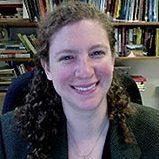
Ninian Stein

Education
- PhD, Brown University, Providence, United States, 2007
- MESc, Yale University, New Haven, United States, 2003
- MA, Anthropology, Harvard University, Cambridge, United States, 2001
- BA, Environmental Studies and Anthropology/Archaeology, Brown University, Providence, United States, 1999
Biography
Trained as an anthropological-archaeologist and an environmental scientist, Professor Ninian Stein's research and teaching spans three areas — environmental policy and communication, landscape change, and environmental justice. Many of her classes and aspects of her research look at environmental policy and communication through the lens of the disciplinary cultures of science and policy. At the heart of Prof. Stein's work is the idea of "landscape literacy" (Spring 2005), that if we can read the past of a place we are better able to plan for its future. Prof. Stein has taught most recently at Smith College, and also at Wheaton College in Norton (MA), the University of Massachusetts Boston, and San Jose State University.
Her current research draws on systems thinking, science and design to create new collaborative decision-making frameworks for communities seeking to increase their sustainability and more effectively utilize and preserve local environmental resources. The manuscript in progress for this work is tentatively titled Bioregional Urbanism 1.0. Her team is partnering with Grove Hall Main Streets and other community organizations to field-test the Bioregional Urbanist methodology in the Grove Hall neighborhood in Dorchester and Roxbury, Massachusetts. She is also finishing a manuscript, Not Your Average Run of the Mill: Combining Environmental History and Industrial Archaeology to Shape the Future of Factory Sites. Based on her environmental and anthropological study of a textile mill in Pawtucket, Rhode Island, and its transformation into an artists' community, the manuscript offers techniques for transforming old industrial buildings into vibrant spaces for community building. This manuscript represents a concrete way to link environmental studies with the concerns of local communities.
The daughter of a career counselor, Prof. Stein especially enjoys talking with students about career paths including jobs, internships, and graduate and professional schools. She has advised undergraduate research and theses at several schools. Someday she hopes to teach a course entitled "Food, Clothing, Shelter: Our Stuff and Sustainability."
Her current research draws on systems thinking, science and design to create new collaborative decision-making frameworks for communities seeking to increase their sustainability and more effectively utilize and preserve local environmental resources. The manuscript in progress for this work is tentatively titled Bioregional Urbanism 1.0. Her team is partnering with Grove Hall Main Streets and other community organizations to field-test the Bioregional Urbanist methodology in the Grove Hall neighborhood in Dorchester and Roxbury, Massachusetts. She is also finishing a manuscript, Not Your Average Run of the Mill: Combining Environmental History and Industrial Archaeology to Shape the Future of Factory Sites. Based on her environmental and anthropological study of a textile mill in Pawtucket, Rhode Island, and its transformation into an artists' community, the manuscript offers techniques for transforming old industrial buildings into vibrant spaces for community building. This manuscript represents a concrete way to link environmental studies with the concerns of local communities.
The daughter of a career counselor, Prof. Stein especially enjoys talking with students about career paths including jobs, internships, and graduate and professional schools. She has advised undergraduate research and theses at several schools. Someday she hopes to teach a course entitled "Food, Clothing, Shelter: Our Stuff and Sustainability."